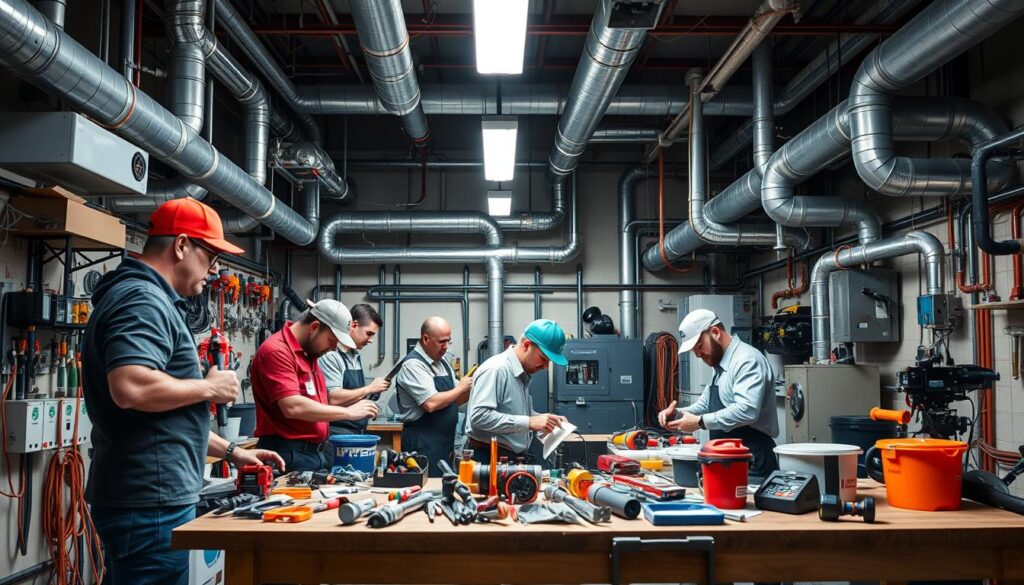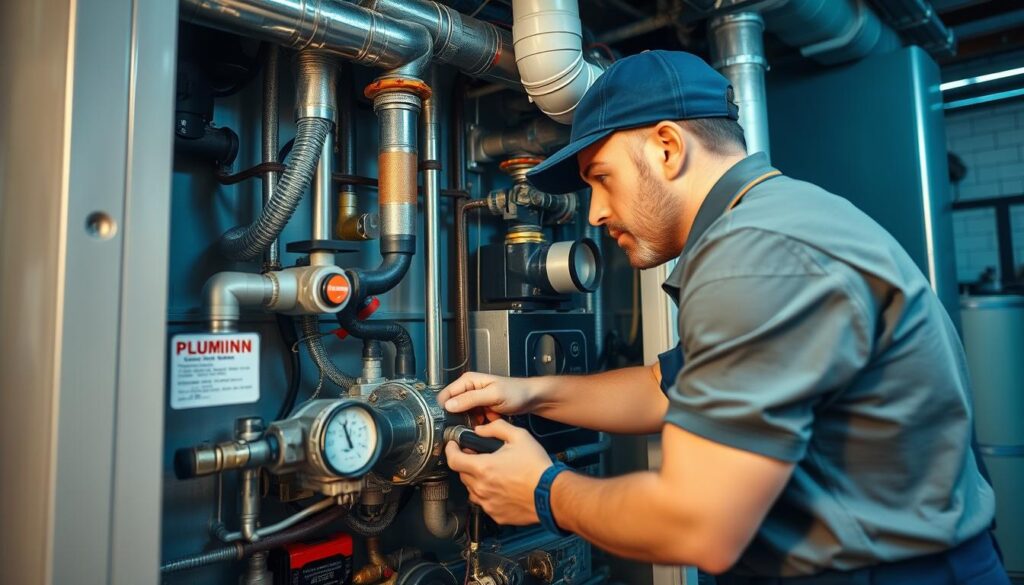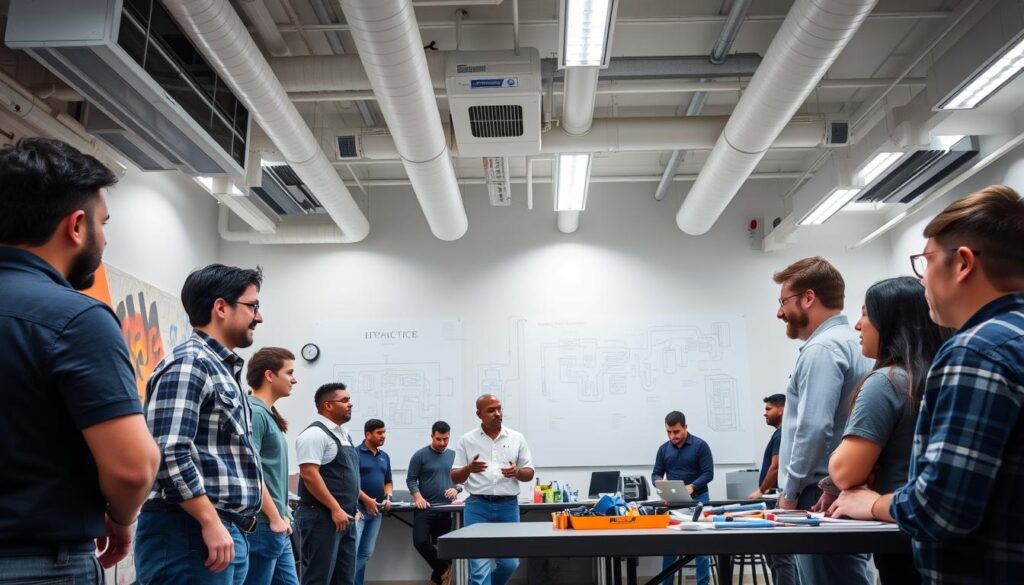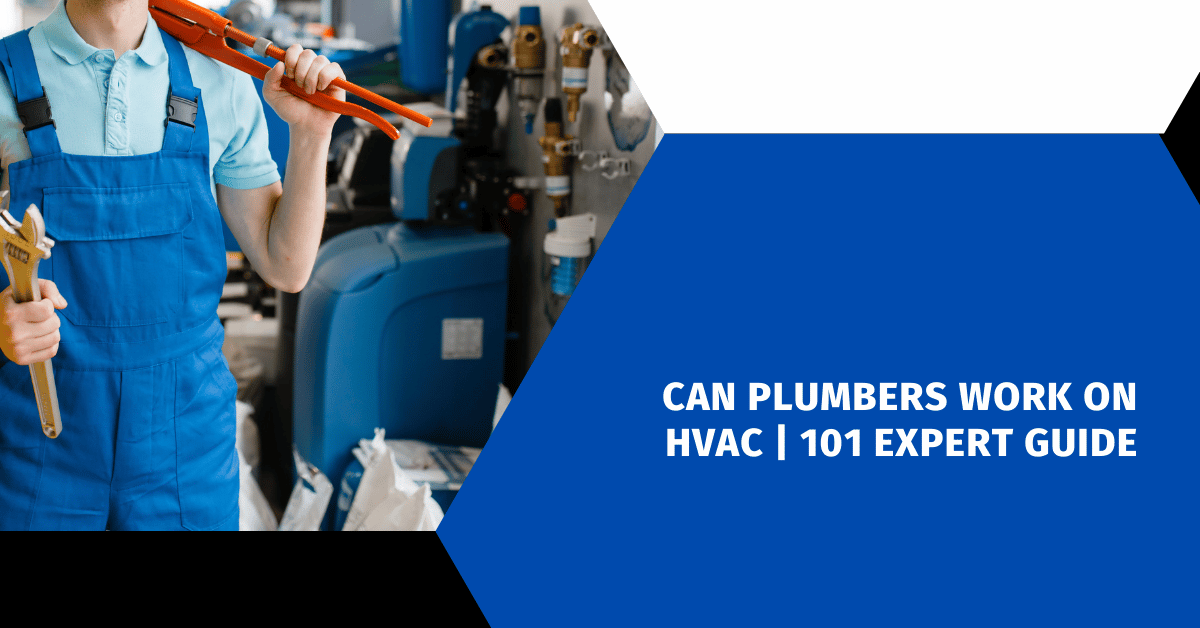Affiliate Disclosure
HVAC Guide Guys is a participant in the Amazon Services LLC Associates Program, an affiliate advertising program designed to provide a means for sites to earn advertising fees by advertising and linking to Amazon.
Can Plumbers Work on HVAC? As a former HVAC technician, I’ve seen how plumbing and HVAC are getting closer. These trades used to be separate, each with its own skills. But now, many are learning both to boost their careers. This mix of skills helps tradespeople understand homes better.
For plumbers, learning HVAC can make you more valuable. You’ll be able to handle more jobs, from fixing pipes to working on heating and cooling. This means more job security, better pay, and happy clients.

Key Takeaways:
- Plumbers can enhance their skillset and market value by cross-training in HVAC.
- Integrating plumbing and HVAC knowledge benefits both trades, leading to more comprehensive solutions for clients.
- Diversifying your expertise can open up new job opportunities and increase your earning potential.
- Understanding the overlap between plumbing and HVAC systems is crucial for providing efficient and effective home services.
- Pursuing cross-training and licensing in both fields can give you a competitive edge in the industry.
Table of Contents
Understanding the Relationship Between Plumbing and HVAC Systems
Plumbing and HVAC systems work together in many ways. Knowing how they relate is key for those in both fields. They share common parts and technical needs, making teamwork essential.
Basic Principles of Integration
Plumbing deals with water, waste, and gas. HVAC controls temperature, humidity, and air quality. Yet, they often overlap, especially in water heaters, ventilation, and gas connections. Working together can make homes more efficient, comfortable, and cost-effective.
Common System Overlaps
- Water heaters: Plumbing and HVAC both use water heaters for hot water, needing coordination.
- Ventilation: HVAC needs ventilation, which plumbers help with by integrating ductwork and vents.
- Gas connections: Both systems might need gas for heating, requiring teamwork for safety and code compliance.
Technical Requirements
Combining plumbing and HVAC systems needs a strong grasp of technical details, codes, and safety. Experts in both areas must know the materials, tools, and installation methods. This ensures smooth integration and top performance.
| Plumbing Materials | HVAC Equipment |
|---|---|
|
|
Understanding plumbing and HVAC systems helps professionals offer complete solutions. They meet homeowners’ needs and ensure these systems work well together.
Can Plumbers Work on HVAC: Licensing Requirements
Plumbers can work on HVAC systems based on local licensing rules. Some places let plumbers do HVAC tasks, but others need special licenses and certifications.
In Virginia, plumbers need more than a plumbing license to work on HVAC. They must get HVAC-specific certifications. This is true in many places across the U.S., with rules changing by state and city.
Plumbers must check local laws before doing HVAC work. Not following these rules can lead to legal and financial trouble. They should know the HVAC licensing and plumber qualifications needed in their area to stay legal.
| State | HVAC Licensing Requirements for Plumbers |
|---|---|
| California | Plumbers must pass both a trade exam and a business and law exam, and show at least four years of experience in the specific HVAC specialty within the previous 10 years to qualify for a license. |
| Alabama | HVAC contractors must either have held an apprenticeship certificate issued by the Board for the previous two years, show transcripts from an approved course, or provide proof of at least 3,000 hours (18 months) of work experience under a licensed contractor to qualify to take the exam. |
| Florida | HVAC licenses are categorized into Class A and B certified or registered contractors, each with varying work limitations and examination requirements. |
By knowing the local HVAC licensing and plumber qualifications rules, plumbers can work legally and safely.
Explore Our HVAC Shop
Looking for top-rated HVAC tools, parts, and accessories? Visit our shop and find the perfect solution for your needs.
Visit the ShopThe Legal Framework and State Regulations
Understanding the laws around plumbing and HVAC is key for professionals wanting to grow. Each state has its own rules for what work is allowed, who can do it, and how to follow the rules. These rules are important for plumbers to know when they work on HVAC tasks.
State-Specific Requirements
The rules for plumbers to work on HVAC systems differ a lot in the U.S. For example, in Alabama, plumbers can get a journeyman license after two years of apprenticeship. In Alaska, there are different licenses like Plumber Journeyman and Plumber Gas. Arizona needs a plumbing contractor license for jobs over $1,000, and Arkansas requires a license for all contractor work, except for personal home projects.
Certification Process
To get certified, you need to finish school, gain experience, and pass exams. In California, you need four years of experience as a journeyman to apply for a contractor license. Colorado requires two years of apprenticeship under a licensed pro to get a residential plumber license.
Compliance Guidelines
Following state and local laws is crucial for the safety and legality of HVAC work. Connecticut has eight plumbing licenses for different types of work. Delaware offers licenses for apprentice, journeyman, master plumber, and plumbing contractor.
By understanding these state laws, plumbers can offer more services. This can help them grow professionally and increase their earnings.
Skills and Knowledge Overlap Between Trades
If you’re a skilled plumber, you might be surprised to find out you already know a lot about HVAC systems. Plumbing and HVAC trades share many skills and knowledge areas. This makes it easier for plumbers to move into HVAC work with some extra training.
Both plumbing and HVAC experts work a lot with pipes and fluids. They need to understand things like fluid dynamics and how to control pressure and temperature. They also need to know about electrical systems, as many plumbing and HVAC parts use electricity.
Plumbers are very versatile, which is great in the industry. Learning both plumbing and HVAC can make a plumber more valuable. This can lead to more job security and higher pay. People with skills in both areas are in high demand, showing there’s a strong need for them.
- Plumbers and HVAC technicians often work together. They do things like venting, gas line connections, and setting up water supplies for HVAC systems.
- Getting HVAC certified can open up more job chances for plumbers. This is especially true in areas that focus on green building and sustainability, where eco-friendly knowledge is needed.
- There are special areas in HVAC, like refrigeration and air quality control. Plumbers with HVAC certification can grow their careers and explore new areas.
By getting HVAC certified, plumbers can offer better solutions to their clients. They can tackle problems from different angles, making their work more effective. This skill can lead to more job opportunities and career growth in the building trades.
Benefits of Cross-Training in Both Fields
Starting a cross-training journey in plumbing and HVAC can open many doors. It lets you grow your skills and move up in your career. You also get to earn more and find new ways to make money.
Career Advancement Opportunities
Having many skills makes you more valuable to employers. They look for people who can do more things, which helps them save money and work better. By learning both plumbing and HVAC, you show you’re flexible and ready for new challenges. This makes you a strong candidate for promotions and important projects.
Income Potential
Being good at more things means you can earn more. People and companies are willing to pay more for those who can solve more problems. This can help you make more money and grow your career.
Market Demand
The need for people who know both plumbing and HVAC is growing. Buildings are getting more complex, and green practices are becoming more common. Being able to work on both systems makes you stand out and can lead to better jobs.
There are many good reasons to cross-train in plumbing and HVAC. It can help you advance in your career, earn more, and meet the demand for skilled workers. By taking on this challenge, you can set yourself up for success and happiness in your future.
Explore Our HVAC Shop
Looking for top-rated HVAC tools, parts, and accessories? Visit our shop and find the perfect solution for your needs.
Visit the ShopCommon HVAC Tasks Plumbers Can Perform
Plumbers can do more than just fix pipes. They can handle HVAC tasks too. With the right training and licenses, they help keep HVAC systems running smoothly. They can work on water heaters, gas lines, and more.
Plumbers are experts at installing and fixing water heaters. They know how to connect them to electrical and gas lines. They can fix problems and keep your water hot and efficient.
- Install and maintain water heaters
- Work on ventilation systems
- Handle gas line connections for heating systems
They also help with ventilation systems. Plumbers know how important good airflow is. They can set up and fix ducts, vents, and other air circulation parts.
Plumbers are good at connecting gas lines for heating. They know how to work with gas appliances safely. This ensures your heating system works right.
“Plumbers possess a unique skill set that allows them to contribute significantly to HVAC-related tasks, providing homeowners with a one-stop solution for their heating, cooling, and plumbing needs.”
What tasks a plumber can do depends on local rules and their certifications. Always check with a pro to make sure they follow local codes and safety rules.

Explore Our HVAC Shop
Looking for top-rated HVAC tools, parts, and accessories? Visit our shop and find the perfect solution for your needs.
Visit the ShopWater Heater Installation and Maintenance Crossover
As a plumber, you’re not just about water supply and drainage. You’re also key in water heater setup and upkeep. This area links plumbing and HVAC, making plumbers with HVAC training perfect for the job.
Gas Line Connections
Gas line connections are vital for water heater safety and efficiency. Plumbers with the right skills can ensure these connections are done right. This prevents gas leaks and other dangers.
Electrical Requirements
Water heater installation also needs electrical work. This includes connecting the power and wiring the unit correctly. Plumbers with HVAC training can manage this, making sure the water heater fits well with the home’s electrical system.
Safety Protocols
Safety is crucial in water heater work. Plumbers must follow strict rules to avoid accidents and hazards. This includes proper ventilation and following local laws to keep the water heater safe.
Understanding the link between plumbing and HVAC lets plumbers offer top-notch water heater services. This benefits homeowners and opens new business chances for skilled plumbers.
| Common Homeowner Complaints | Causes of Plumbing Crossover |
|---|---|
| – Not enough hot water – Hot water runs out quickly | – Single-handle faucets – Mixing valves – Check valves – Incorrect hot and cold water pipe connections |
Fixing water heater problems needs a deep grasp of plumbing and HVAC. This makes plumbers with crossover skills very valuable to homeowners and the industry.
Specialized Tools and Equipment Requirements
Working on HVAC systems requires specific tools and equipment. Plumbers need more than standard plumbing tools. They need refrigerant gauges, vacuum pumps, and leak detectors for HVAC work.
Knowing these tools well is key for plumbers wanting to work on HVAC. They must get proper training and certification. This ensures they use these tools safely and effectively.
Experts say there are 50 top HVAC tools needed for quality service. These tools are split into two groups: manual and calculation tools, and software for business management.
Essential HVAC tools include screwdrivers, pliers, and wrenches. Prices vary from $10 to $200, depending on quality and brand. Safety tools like gloves and masks cost between $10 to $100.
Advanced HVAC and air conditioning tools include core removal tools and thermometers. Prices range from $10 to $80. Brands like Craftsman and Milwaukee are often recommended.
Choosing HVAC tools involves balancing cost and quality. High-quality tools may cost more upfront but are worth it for their long-term performance.
Plumbers also need to know about licenses and certifications for HVAC work. State rules on worker safety are important when using tools like drills and saws.
By investing in the right tools and getting proper training, plumbers can grow their services. This can lead to more skills and higher earnings.
Explore Our HVAC Shop
Looking for top-rated HVAC tools, parts, and accessories? Visit our shop and find the perfect solution for your needs.
Visit the ShopTraining and Certification Pathways
For plumbers wanting to dive into HVAC, getting the right training and certification is key. They need to learn more than just plumbing. They must gain special knowledge and skills for HVAC work.
Educational Requirements
First, plumbers take courses in HVAC theory, system design, and energy efficiency. These classes lay a strong foundation in HVAC principles and technology. Many schools and programs offer HVAC training for plumbers looking to grow their skills.
Practical Experience Needs
- Getting hands-on experience is vital, often through apprenticeships or on-the-job training.
- Apprenticeships let plumbers learn from seasoned HVAC techs, gaining real-world skills.
- On-the-job training lets plumbers use what they learned in real HVAC jobs.
Combining formal education with practical experience is essential. It helps plumbers master HVAC system work.
| Certification Pathway | Description |
|---|---|
| EPA 608 Certification | This certification, needed in all 50 states, teaches how to handle refrigerants safely to protect the environment. |
| HVAC Excellence Certification | This well-known credential tests both knowledge and skills in HVAC installation, maintenance, and repair. |
Passing certification exams is a big step for plumbers. It shows they know both theory and practical skills for HVAC work.

Business Opportunities for Dual-Licensed Professionals
If you’re a dual-licensed professional in plumbing and HVAC, you have many business opportunities. Your skills in both areas can help you serve more clients. This can grow your business and increase your earnings.
Being dual-licensed means you can take on more projects. You can work on heating and cooling systems, water heaters, and plumbing. This makes you a go-to for clients, saving them time and hassle.
The need for experts in both plumbing and HVAC is growing. As buildings get more energy-efficient, these systems are becoming more important. Dual-licensed professionals are ready to meet this demand, offering valuable skills and efficiency.
Dual-licensed professionals can also earn more. By offering a wide range of services, they can charge more for their work. This can help them financially and grow their business.
“Being a dual-licensed professional in plumbing and HVAC has been a game-changer for my business. It’s allowed me to take on a wider variety of projects, increase my client base, and ultimately, grow my bottom line.”
To make the most of these opportunities, stay updated on industry trends and rules. Keep learning and improving your skills. This will keep you ahead of the competition and make you a trusted expert in your area.
In conclusion, dual-licensed professionals in plumbing and HVAC have a lot to gain. They can offer more services, increase their earnings, and become valuable to their clients. Whether starting or growing a business, dual-licensing can be a smart move for success.
Explore Our HVAC Shop
Looking for top-rated HVAC tools, parts, and accessories? Visit our shop and find the perfect solution for your needs.
Visit the ShopSafety Considerations and Best Practices
Plumbers entering the HVAC field face unique safety challenges. They must manage risks and have the right insurance to protect themselves and their clients.
Risk Management
HVAC systems use dangerous refrigerants, high-pressure equipment, and complex electrical parts. Plumbers need training to work with these safely. They must follow safety rules, wear protective gear, and keep up with building codes.
Insurance Requirements
Working on HVAC systems comes with big liability risks. Plumbers need insurance, like workers’ comp and general liability, to cover accidents or damage. Keeping records shows they follow the law and industry standards.
| Risk Factor | Key Considerations |
|---|---|
| Refrigerant Leaks | Proper handling and containment of refrigerants to prevent environmental hazards and health risks. |
| Electrical Hazards | Comprehensive training on electrical safety, including lockout/tagout procedures and grounding protocols. |
| High-Pressure Equipment | Rigorous maintenance, inspection, and safety protocols for pressurized components like compressors and coils. |
| Slip, Trip, and Fall Risks | Maintaining a clean and organized work environment, using appropriate personal protective equipment (PPE), and following best practices for ladder and scaffold use. |
By focusing on safety, plumbers can handle HVAC risks well. They offer great service to clients while keeping themselves and their business safe.
Conclusion
Plumbers can work on HVAC systems, but they need extra training and certifications. This mix of plumbing and HVAC skills opens up new career paths. It also lets professionals offer more services, making them stand out in a competitive field.
Those working in HVAC plumbing must know local building codes well. They need to understand complex HVAC systems and have the right tools. This ensures their work is safe and reliable, often with warranties and good reputations.
Working in both plumbing and HVAC can help professionals grow their business. By getting the right certifications and following local rules, plumbers can become key players in the HVAC world. This opens up new chances for growth and success.

